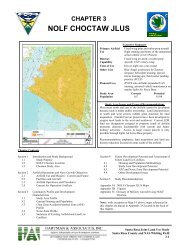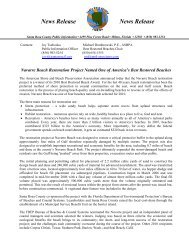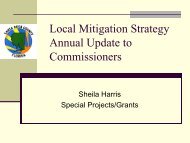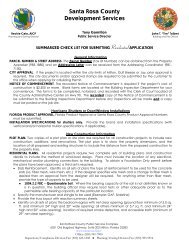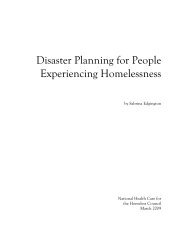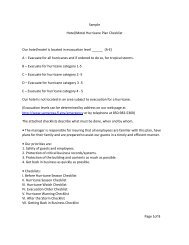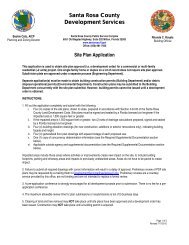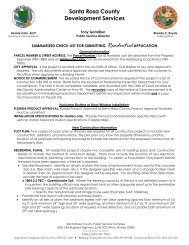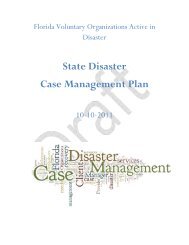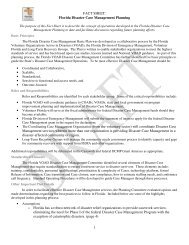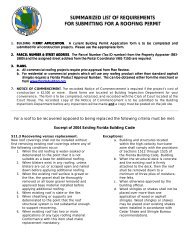Disaster - Santa Rosa County
Disaster - Santa Rosa County
Disaster - Santa Rosa County
You also want an ePaper? Increase the reach of your titles
YUMPU automatically turns print PDFs into web optimized ePapers that Google loves.
Sheltering from the Storm<br />
Emergency Management, in conjunction with<br />
the <strong>Santa</strong> <strong>Rosa</strong> <strong>County</strong> School District and<br />
the American Red Cross, oversees emergency<br />
sheltering for impacted and displaced residents<br />
during times of emergency. Hurricane shelters<br />
will be opened as needed when evacuation orders<br />
are issued. Shelter openings will be announced<br />
through all means possible including local media<br />
outlets, press conferences and public meetings.<br />
All shelters may not be opened at the same time,<br />
therefore attention must be given to the current<br />
shelter status in <strong>Santa</strong> <strong>Rosa</strong> <strong>County</strong>.<br />
14<br />
Shelters<br />
Special Needs<br />
Shelter<br />
When Your Home is Not Safe<br />
Shelters are a Last Resort<br />
Buildings used for evacuation shelters are normally public schools<br />
that are staffed by specially trained American Red Cross volunteers<br />
and staff. Shelters are generally crowded, usually uncomfortable<br />
(especially when the power goes off because there is no ventilation),<br />
have long lines to use restrooms and get food, and are very noisy,<br />
making it difficult to rest or sleep. Keep in mind you may have to stay<br />
in the shelter for several days.<br />
Special Needs Shelter<br />
The department of health operates the special needs shelter in <strong>Santa</strong><br />
<strong>Rosa</strong> <strong>County</strong>. This shelter is for those individuals who are selfmaintained<br />
in the home setting, but may need additional support or<br />
power during a disaster. These shelters are not equipped with advanced<br />
medical equipment nor are they staffed to provide advanced medical<br />
care.<br />
You should pre-register and bring your caregiver. If you are<br />
oxygen dependant, bring an extra tank, concentrators, nebulizers<br />
and any other necessary equipment. Dialysis clients should dialyze<br />
immediately prior to departing for the shelter. Residents can preregister<br />
online for the special needs shelter at www.santarosa.<br />
fl.gov/emergency/specialneeds.html or by calling (850) 983-5360.<br />
Don’t Wait!<br />
Downed power lines, trees and flooding may make it difficult, if not<br />
impossible, to reach shelters during a hurricane. Allow for adequate<br />
time to reach a shelter before winds and rain become severe.<br />
If you need transportation to a shelter, call<br />
(850) 983-INFO. Transportation will not be available after<br />
the arrival of tropical storm force winds.<br />
Shelter openings may vary with each emergency. If<br />
you are unable to receive media information during an<br />
event contact the Citizen Information Center at (850)<br />
983-INFO (4636) for a listing of which shelters will<br />
be opened. Shelter openings will differ by size and<br />
intensity of a disaster. Do not go to the shelter until you<br />
have verified that it is open.<br />
Here are some things you should know about going to<br />
an evacuation shelter:<br />
• Evacuation shelters are provided for public use in<br />
the event an evacuation becomes necessary and if<br />
you have no other place to go.<br />
• It is recommended that other arrangements be made<br />
with a friend or relative that lives in a wellconstructed<br />
home, out of the evacuation area, and<br />
properly protected to withstand hurricane force<br />
winds. You will be more comfortable in a less<br />
crowded environment and among friends.<br />
• Remember, no alcohol or weapons are allowed.<br />
• Only cats and dogs are permitted in the pet friendly<br />
shelter (see page 11).<br />
What to take to a shelter<br />
If you go to a public evacuation shelter,<br />
you will need to take:<br />
33<br />
A change of clothing, rain gear and sturdy shoes.<br />
33<br />
Toiletries and personal items.<br />
33<br />
Blankets or sleeping bags.<br />
33<br />
Identification and any important papers.<br />
33<br />
Games or toys for children; books for adults.<br />
33<br />
Special items for infants or elderly family<br />
members.<br />
33<br />
Any special dietary needs and nonperishable foods<br />
for snacks.<br />
33<br />
Battery operated radio, flashlights and plenty of<br />
spare batteries.<br />
33<br />
Prescription medications or any over-the-counter<br />
medications you normally take.<br />
33<br />
Health insurance and pharmacy cards.




